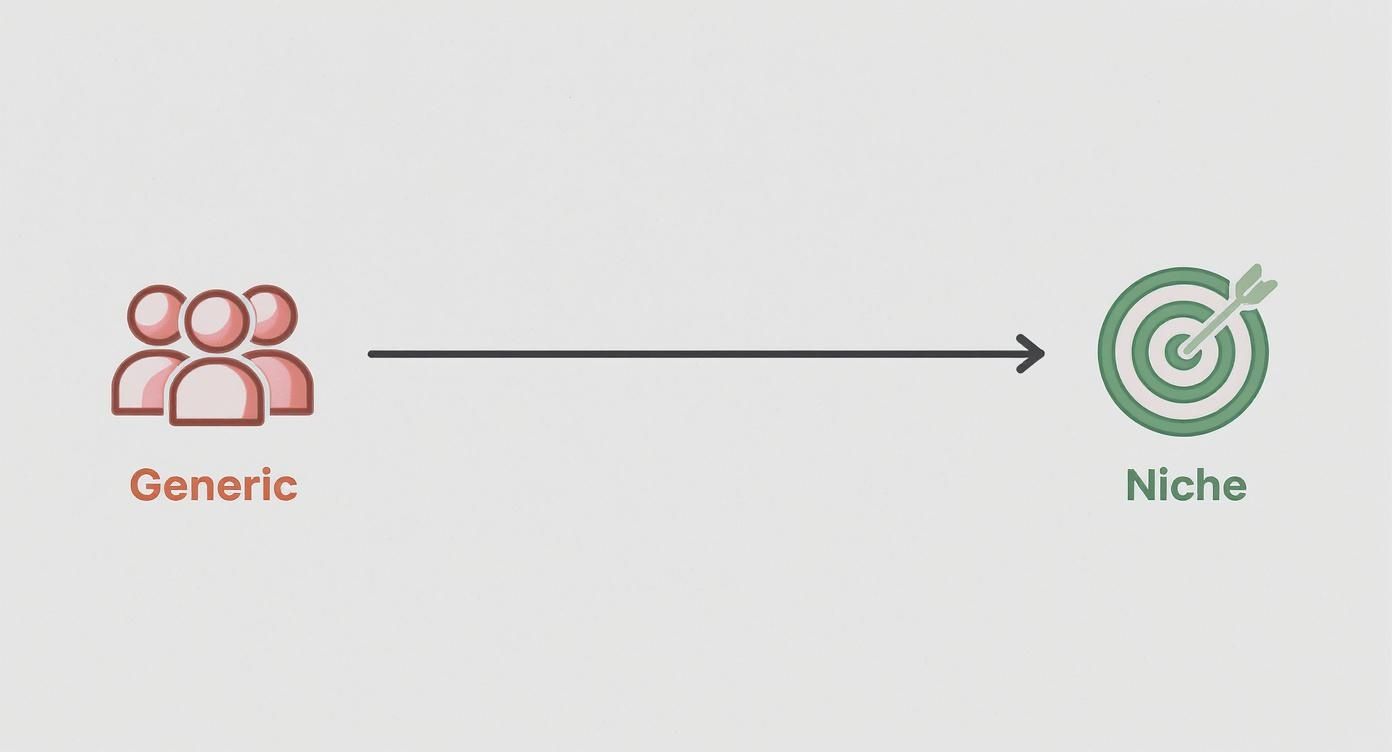
Most founders get Reddit wrong. They parachute into a massive community like r/technology, drop a link, and wonder why they’re getting downvoted into oblivion.
We learned this the hard way at BillyBuzz. The goal isn't finding the biggest audience—it's finding the right one. A smart, targeted search for subreddits is the bedrock of our growth on the platform.
Stop Chasing Vanity Metrics
It feels good to post in a subreddit with millions of subscribers. It feels like a huge win, but it never is. The breakthrough moment for us was when we stopped broadcasting and started connecting. It’s about finding those smaller, hyper-engaged communities where our ideal customers are already talking about the exact problems we solve.
This isn't a generic list of tips; this is our exact playbook. We're showing you how we search for subreddits to find the niche forums where real conversations happen. This is the single most important factor for driving meaningful growth, not just a temporary spike in vanity traffic.
The core mistake is prioritizing subscriber counts over conversation quality. A subreddit with 10,000 active members in your niche is infinitely more valuable than a generic one with two million passive scrollers.
Why Niche Communities Win
Smaller subreddits give you a massive advantage: context. The conversations are focused, the users are knowledgeable, and any genuine contribution you make is far more likely to get noticed. This is how you build authority. For example, instead of wading into r/SaaS, we get more traction in places like r/productmanagement or r/CustomerSuccess.
You have to understand the landscape. Reddit's scale is mind-boggling—with over 1.1 billion monthly users and communities constantly evolving—but engagement is not evenly distributed. A huge subreddit might have a ton of comments, but niche communities are where you'll find deeper, relevant interactions. This in-depth analysis of subreddit trends shows just how dynamically these communities grow.
Concentrating your effort saves time and delivers better results. You stop shouting into a void and start participating in meaningful dialogues. We’ve even put together some of our favorites—check out our guide on the top 5 subreddits for small business insights.
Our Layered Subreddit Discovery Process
Throwing darts in the dark to find good subreddits doesn't work. We figured that out fast. Relying on one search method means you're leaving high-potential communities on the table. So, at BillyBuzz, we built a multi-layered process that takes us from broad discovery to the nitty-gritty.
It’s all about finding the right communities, not just the biggest ones.
The goal is to shift from a wide, generic audience to a highly targeted, niche group of people who actually care about what you have to say. That's where the real conversations—and conversions—happen.

Deep engagement with a focused group will always beat superficial exposure to a crowd that couldn't care less.
Starting with Google's Authority Signals
Our first stop isn't Reddit—it's Google. Google has already done the work vetting online communities. We piggyback on that using advanced search operators.
This query is our secret weapon:site:reddit.com inurl:"/r/" "customer pain point"
Since BillyBuzz is a social listening tool, we search for phrases like site:reddit.com inurl:"/r/" "how to track brand mentions" or "best tool for reddit monitoring".
This immediately shows us threads where people are actively looking for a solution, pointing us directly to the subreddits Google already views as authoritative on the topic.
Mastering Reddit's Native Search
With a starting list from Google, we head to Reddit. The native search bar is powerful if you use boolean operators to cut through the noise.
A typical search for us might look like this:"social listening" AND "tool" NOT "free"
This helps us find conversations about social listening tools but filters out the noise from people looking for freebies who aren't our target customer. The trick is to pair your product category with a user problem or action.
After hitting search, we always filter results by 'New'. This ensures we’re looking at what’s happening now, not some archived thread from five years ago.
Our Mindset Shift: We don't just search for our product's features. We search for the problems our product solves. This simple change is the key to finding communities where potential customers are literally asking for help.
Layering on Data with Third-Party Tools
With a solid list of potential communities, we bring in the data. Gut feelings are great, but numbers tell the real story. Tools like Subreddit Stats give us a quick, objective snapshot of a subreddit’s health.
We zero in on a few key metrics:
- Subscriber Growth Rate: Is the community growing, or is it on life support? We're looking for a steady, positive trend.
- Comments Per Day: This is often more insightful than posts per day. It shows genuine engagement.
- Keyword Analysis: We scan the most common keywords to double-check that the conversations align with our brand and our target audience's language.
Finishing with Manual Subreddit Hopping
The final step is manual exploration. This is where we consistently find hidden gems. We take our most promising subreddits and go straight to their sidebars. Moderators of well-run communities almost always link to other relevant, like-minded subreddits.
It's like going down a productive rabbit hole.
Clicking through "Related Subreddits" or "Community" links can lead you to hyper-niche communities you would never have found otherwise. It’s that irreplaceable human touch that puts the finishing polish on our process to search for subreddits.
This layered approach is the bedrock of our Reddit strategy, something we dive into deeper in our guide on uncovering hidden gems with keyword tracking on Reddit.
To give you a clearer picture, here’s a quick breakdown of how these methods stack up and when we use them.
Our Go-To Subreddit Search Methods
| Search Method | Best For | Our Pro-Tip |
|---|---|---|
Google site: Search |
Initial discovery & finding high-authority communities. | Search for pain points and "alternative to [competitor]" queries. |
| Reddit Native Search | Filtering conversations with precision using boolean operators. | Always filter by 'New' to find the most current and active discussions. |
| Third-Party Tools | Data-driven validation and health checks of potential subreddits. | Focus on comments per day over subscribers. Engagement is king. |
| Manual Hopping | Uncovering hyper-niche and closely related "sister" communities. | Check the sidebars and wikis of top-tier subreddits first. |
Each method builds on the last, giving us a comprehensive and battle-tested way to find exactly where our audience is hanging out.
How We Qualify a Subreddit Before Engaging
So you've found a few promising subreddits. Now the real work begins: figuring out if that community is actually worth your time. A massive subscriber count can be a total vanity metric, often hiding a digital ghost town.
This isn’t about just getting a "good vibe." It’s a quick, data-driven process we use at BillyBuzz to separate high-value communities from duds. After doing this thousands of times, we've learned that a few key signals tell you everything you need to know.

The 'Online Now' Ratio
First thing I check is the ratio of members "Online Now" to the total subscribers. It’s a simple calculation, but it’s a powerful, real-time indicator of a community's pulse. A subreddit with a million members but only 500 people online is essentially dead.
Our internal benchmark is an online ratio of 1% or higher. If a community with 50,000 members has at least 500 people online, it’s a good sign. Anything much lower tells me that while people may have subscribed, they aren't actually sticking around.
For instance, we recently passed on a community with 200,000 subscribers because its online count consistently hovered around 800—a ratio of just 0.4%. In contrast, a smaller subreddit with 40,000 members that regularly has 600+ online (1.5%) is a far better place to invest our energy.
Post Frequency and Comment Depth
Next, I dive into the conversational flow. How often are people posting? And more importantly, is anyone talking back? A subreddit full of posts with zero comments is a massive red flag.
I’ll spend a few minutes scrolling through the top 10-15 posts in the "New" feed, looking for:
- Post Velocity: Are there a bunch of new posts from the last 24 hours? If the newest posts are from days or weeks ago, I'm out.
- Comment-to-Post Ratio: I'm looking for an average of at least 5-10 comments per post (not counting spam bots). This is where you see if real discussions are happening.
- Comment Quality: Are the comments thoughtful, or just one-word replies?
This gut check is critical. Research shows a staggering number of Reddit posts never get more than a single upvote. You can explore the research on Reddit post distribution to see just how common this is. Vetting for comment depth saves you from shouting into the void.
A healthy subreddit isn't a billboard where people drop links. It's a living forum. If the top posts are all unanswered questions, it’s a sign the community doesn't have the active problem-solvers you want to connect with.
The Moderation Litmus Test
Finally, I assess the rules and the moderators. This tells you whether the community welcomes experts or is hostile to anyone who isn't already an insider.
I head straight to the sidebar and read every rule. Here's what I'm looking for:
- Rule Clarity and Tone: Are the rules clear and fair? Or is it an aggressive, all-caps list of "DON'Ts"?
- Self-Promotion Policy: A flat-out ban isn't a deal-breaker, but communities that allow for value-first contributions (a 90% value, 10% promotion mindset) are ideal.
- Moderator Activity: Are the mods active in discussions? A quick peek at their profiles shows if they’re engaged community leaders or just absent rule-enforcers.
A subreddit with overly harsh rules and inactive mods is a recipe for getting your account banned. This careful vetting is a non-negotiable part of our search for subreddits, making sure we invest our effort where it will be welcomed and rewarded.
Setting Up Automated Keyword Alerts
You've done the hard work of finding and vetting subreddits. Now what? You can't hit refresh 24/7, hoping to stumble upon the perfect conversation. That's how you burn out.
This is where automation becomes your secret weapon. Manual monitoring is a losing game. We built BillyBuzz to turn this chore into an opportunity pipeline. Instead of passively listening, we get instant pings about high-intent conversations, letting us be the first one in the door to offer help.
It’s not just about saving time. It’s about being there the moment someone needs you.
Building Our High-Intent Keyword List
The power of any alert system is tracking the right keywords. We don't just track our brand name; we listen for the language of need. Our alerts are built around "buying signals" and pain points people express before they start looking for a solution.
Here are a few examples of the keyword alerts we actually use in BillyBuzz:
- Problem-Aware Keywords: "how to track mentions on reddit," "is there a tool for social listening," "tired of manually checking subreddits"
- Solution-Seeking Keywords: "looking for a tool that," "recommendation for," "anyone know an app for"
- Competitor-Based Keywords: "alternative to Brandwatch," "Mention vs," "is Awario worth it"
When someone types "alternative to Brandwatch," they're not just browsing—they're in the market. This gives you a perfectly timed opening.
Here’s a look at how we set up these alerts inside our BillyBuzz dashboard to pipe notifications directly into Slack.

The goal is to cut through the chatter and get only the conversations that matter delivered right to your team.
Fine-Tuning Alerts for Maximum Relevancy
Just plugging in keywords isn't enough. Without smart filters, your alerts will create more noise.
Our Philosophy: An alert should feel like an opportunity, not a chore. If you ignore your notifications, your filters aren't tight enough. Every alert should make you want to jump into that conversation.
Inside BillyBuzz, we lean heavily on a few key filters to make every notification actionable:
- Subreddit Targeting: We focus alerts on our pre-vetted list of 10-15 high-value subreddits like r/marketing, r/PPC, and r/socialmedia. This stops notifications from random communities.
- Negative Keywords: We're aggressive with them. For "social listening tool," we add
-"free"or-"internship"to filter out conversations from people who aren't potential customers. - Sentiment Analysis: This is useful for competitor mentions. We set alerts to trigger only for posts with neutral or negative sentiment, so we find users who are unhappy with their current tool.
This level of precision turns monitoring into a strategic advantage. For those building their own systems, understanding the programmatic side is key. A good guide on the Reddit posting API can be valuable.
Once this system is dialed in, you stop being a reactive searcher and become a proactive problem-solver. If you want to see exactly how it works, we created a guide on how to set up Slack alerts for Reddit mentions in 10 minutes.
Our Go-To Response Template
When an alert hits, we use a simple, value-first template. It’s not about pitching; it’s about helping.
Template:
"Hey [Username], saw you were looking for [the solution]. I've been in that boat. We found that [brief insight or tip] really helped.
Full disclosure, I'm the founder of BillyBuzz, which we built to solve this exact problem by [one-sentence value prop]. Not trying to sell you hard, but it might be useful if you're still looking. Happy to answer any questions either way!"
This approach is honest, helpful, and respects the community.
Tapping into Emerging Subreddit Communities
Some of my biggest wins haven't come from the big, famous subreddits. They’ve come from being one of the first experts in a new, rapidly growing community. While massive subreddits can feel jaded, these smaller ones are often looking for real expertise.
When you get in on the ground floor, you’re not just another commenter. You become a foundational member. This isn't about getting lucky; it's about systematically spotting the right signals. The whole idea is to build authority that grows with the community.
How to Spot a Rising Star
So, what does a promising new community actually look like? It boils down to passionate mods and an unusually high level of engagement for its size. A small subreddit where people are really talking is a goldmine.
Here are the specific signals I always look for:
- High Engagement-to-Member Ratio: A subreddit with 2,000 members that gets 30 comments on every post is infinitely more valuable than a community with 50,000 members where posts get two comments.
- Active, Passionate Mods: Take a look at the moderator list. Are they part of the conversation? Mods who are genuine members create a much better, healthier space.
- A Well-Defined Niche: The more specific, the better. Broad, catch-all subreddits often devolve into low-quality posts. I want a community with a clear purpose.
Reddit is on a massive growth trajectory, projected to hit around 108 million daily active users by early 2025. That scale is why you need an efficient way to find these up-and-coming communities before they get saturated. If you're interested in the data, you can explore detailed subreddit growth statistics to see how fast some of these communities pop up.
The best time to join a community is when it feels like a small, passionate club. By the time it's a stadium, you're just another face in the crowd. Your goal is to become an 'original gangster' of the community.
To make this discovery process less of a manual grind, you can use powerful Reddit integrations to automatically keep an eye on growth trends and engagement numbers. Finding these hidden gems is a key part of how to search for subreddits like a pro.
Answering Your Top Questions
Let's tackle some of the most common questions founders have when they start digging into Reddit.
How Many Subreddits Should I Actually Focus On?
It's tempting to cast a wide net, but you'll get far better results by going deep, not broad. Don't spread yourself too thin.
I always advise clients to build a "Top 5" list. These are your core communities—the highly relevant, active subreddits where you'll spend most of your time building a reputation. Beyond that, keep a secondary list of maybe 10-15 other communities that you monitor with a tool like BillyBuzz. This lets you jump on opportunistic conversations without getting overwhelmed.
Remember, deep engagement in a few key places will always outperform low-effort posts scattered across dozens of subreddits.
What's the Biggest Rookie Mistake People Make?
Hands down, it's chasing big numbers. People see a subreddit with 2 million subscribers and think they've struck gold, ignoring a smaller, more focused community of 10,000 that's a perfect fit for their niche.
The classic mistake is prioritizing size over relevance. An active, tight-knit community is infinitely more valuable than a massive, passive one. Look for quality conversations, not just a big subscriber count.
A smaller, engaged subreddit is where real connections and meaningful visibility happen. This is the foundation of a Reddit strategy that actually works.
Is It Enough to Just Search For My Product's Keywords?
That's a starting point, but if you stop there, you're missing the real opportunities. You have to learn to think like your customer.
Instead of just searching for your brand name, expand your search to include:
- The problems you solve: What pain points are people complaining about? Think phrases like "social media management is overwhelming" or "how to track sales leads."
- Your ideal customer's job title: Where do they hang out? Look for discussions in communities like r/salesops or r/devops if that's your audience.
- Your competitors and related tools: What "alternatives to [competitor]" are people looking for? This is a goldmine for high-intent conversations.
This approach helps you find the subreddits where your future customers are actively looking for solutions. You'll uncover communities you never would have found otherwise, putting you right in the middle of the conversations that matter most.
Stop missing out on customers talking about your product on Reddit. BillyBuzz uses AI to find high-intent conversations and sends them directly to your Slack, so you can join in at the perfect moment. Start finding your future customers today.
